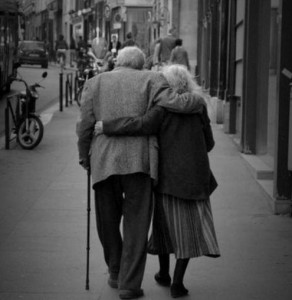I was watching an old episode of “Frasier” last night in which Frasier’s father starts dating the widower of a long-time family friend, sparking this exchange:
Frasier: Dad, listen, Stan’s been gone a while now. I mean, you’re not teenagers, you’re two mature people reaching out for some companionship. I think it’s adorable.
Martin: [outraged, offended] Adorable?!
=======================================
When I was an undergrad one of my professors spent much of the class encouraging us to examine the use of the word “feisty.” Her premise was that in our culture we only apply that word to either the very young, the very old, or the very weak — someone who is otherwise powerless but shows strength despite our expectations. I got it immediately because even as a relatively young person at the time, I was already noticing that our culture reserves the adjectives “cute” and “adorable” for babies, puppies, elders — and especially elderly couples.
It’s a verbal ploy to remove any potency or gravitas from a situation we otherwise take very seriously: the pair-bonding of two human beings. We don’t typically attend weddings of 20- or 3-something couples and, gazing at the bride floating down the aisle, whisper, “She’s so adorable!” We save our serious words — “beautiful,” “elegant,” “perfect together” — for the young and young in love.
A 64-year-old Huffington Post contributor named Anne Brenoff tried to make a similar point on her own blog and was thoroughly excoriated in the Comments section. There were the inevitable references to “the word police” and, of course, the claims that “I call everyone adorable!” and the senior who responded that she “loves” being called adorable. All missing the point.
The point is this: Words are very, very powerful. Until we truly grasp that, we can’t communicate with one another on these topics. Microaggressions, a form of unintended bias, is a term most commonly applied to race, gender and sexual orientation but it’s relevant here as well. To characterize a dignified human being as cute, darling, or adorable underscores our culture’s dismissal of that person’s (or their relationship’s) power and status. To see a young, newly-formed couple holding hands and observe, “They’re so perfect together” is to acknowledge that you are taking them seriously. To view an elderly, newly-formed couple holding hands and respond (in one of those squee, golly-gosh-darn voices), “They’re so cute together!” means something completely different. And one of the things it means, I suspect, is that the elderly couple is considered asexual. I think assumptions about sexuality (or lack thereof) play a big role in how we characterize our senior population. I seriously doubt that if it were well-known that the newly-hooked-up 65-year-old couple at the party were the ones who were having the hottest, sweatiest, nastiest sex on the planet, anyone would look at them, cock their head like they were gazing at a poodle puppy and say, “Oh my gosh, they’re so adorable!”
Save “cute” and “adorable” for puppies and kittens and babies. I’m a force of nature and will be until the day I die. Any relationship I’m going to be in will neither be cute and adorable. It’s going to be passionate, fiery, wild, consuming, fervid, frenzied, sexual, sensual, and breathless.
In other words, so much more than cute. And that doesn’t mean I’m feisty. It means I’m mighty.

